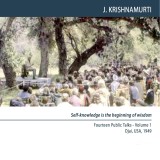Details

Why do we want to dominate or be subservient to another?
Ojai 1949 - Public Talk 11|
4,99 € |
|
| Verlag: | Krishnamurti Foundation Trust UK |
| Format: | MP3 (in ZIP-Archiv) |
| Veröffentl.: | 01.01.2018 |
| ISBN/EAN: | 9781911140054 |
| Sprache: | englisch |
Dieses Hörbuch erhalten Sie ohne Kopierschutz.
Beschreibungen
"Why do we want to dominate or be subservient to another? - 20 August 1949
• Why is it that we dominate, consciously or unconsciously?
• To submit oneself to another is the negative form of domination. We shall not
be able to solve this problem by thinking in terms of opposites.
• Is not domination a process of isolation, which denies relationship?
• Can there be relationship between two people if there is any sense of
domination or submissiveness?
• Q: Is not the experience of the past a help towards freedom and right action in
the present?
• Q: Is my believing in survival after death a hindrance to liberation through self-
knowledge?
• Q: Why is it certain individuals identify themselves with you or with your state
of being and thereby gain authority for themselves?"
• Why is it that we dominate, consciously or unconsciously?
• To submit oneself to another is the negative form of domination. We shall not
be able to solve this problem by thinking in terms of opposites.
• Is not domination a process of isolation, which denies relationship?
• Can there be relationship between two people if there is any sense of
domination or submissiveness?
• Q: Is not the experience of the past a help towards freedom and right action in
the present?
• Q: Is my believing in survival after death a hindrance to liberation through self-
knowledge?
• Q: Why is it certain individuals identify themselves with you or with your state
of being and thereby gain authority for themselves?"
J. KRISHNAMURTI Jiddu Krishnamurti (May 12, 1895–February 17, 1986) was a world renowned writer and speaker on philosophical and spiritual subjects. His subject matter included: the purpose of meditation, human relationships, the nature of the mind, and how to enact positive change in global society. Krishnamurti was born into a Telugu Brahmin family in what was then colonial India. In early adolescence, he had a chance encounter with prominent occultist and high-ranking theosophist C.W. Leadbeater in the grounds of the Theosophical Society headquarters at Adyar in Madras (now Chennai). He was subsequently raised under the tutelage of Annie Besant and C.W. Leadbeater, leaders of the Society at the time, who believed him to be a "vehicle" for an expected World Teacher. As a young man, he disavowed this idea and dissolved the world-wide organization (the Order of the Star) established to support it. He claimed allegiance to no nationality, caste, religion, or philosophy, and spent the rest of his life traveling the world as an individual speaker, speaking to large and small groups, as well as with interested individuals. He authored a number of books, among them The First and Last Freedom, The Only Revolution, and Krishnamurti's Notebook. :" In addition, a large collection of his talks and discussions have been published. At age 90, he addressed the United Nations on the subject of peace and awareness, and was awarded the 1984 UN Peace Medal. His last public talk was in Madras, India, in January 1986, a month before his death at home in Ojai, California. His supporters, working through several non-profit foundations, oversee a number of independent schools centered on his views on education – in India, England and the United States – and continue to transcribe and distribute many of his thousands of talks, group and individual discussions, and other writings, publishing them in a variety of formats including print, audio, video and digital formats as well as online, in many languages.














